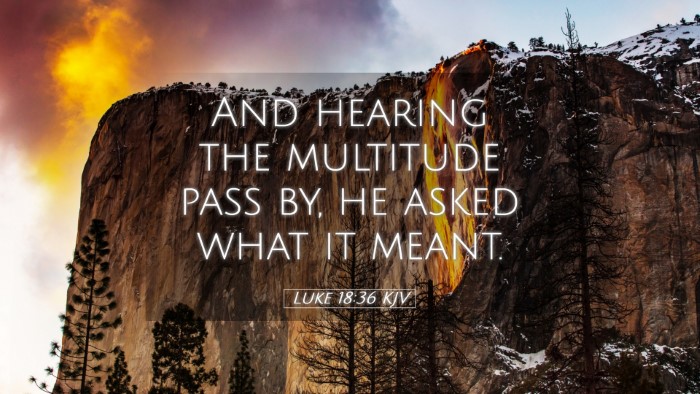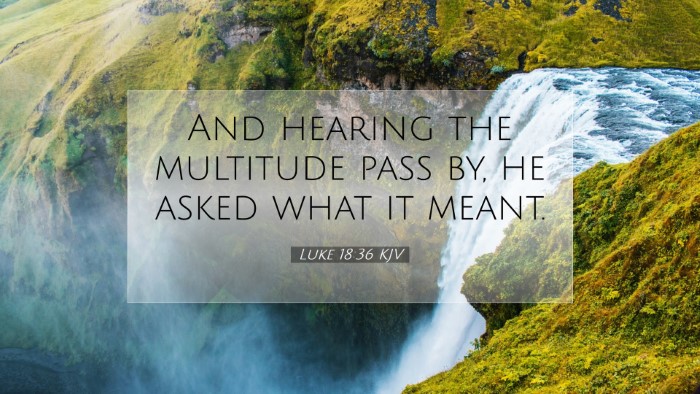Bible Commentary on Luke 18:36
Luke 18:36 states, "And hearing the multitude pass by, he asked what it meant." This passage is steeped in meaning and invites exploration into the nature of faith, the significance of awareness, and the importance of inquiry in the pursuit of understanding the workings of God.
Contextual Background
In the Gospel of Luke, this verse occurs in the context of Jesus' journey to Jerusalem, where He is approaching the climax of His earthly ministry. The atmosphere is charged with anticipation as Jesus is hailed by the multitudes. This setting is crucial for understanding the implications of the verse.
Matthew Henry's Insights
According to Matthew Henry, this passage serves as an illustration of a blind man's longing for sight—both physical and spiritual. Henry emphasizes the significant role of the multitude, which is a representation of societal influences around those in need:
- Awareness and Inquiry: The blind man’s question about the commotion exemplifies a deep desire for understanding the source of his hope.
- Spiritual Perception: Henry remarks that although the man is physically blind, his spiritual insight is keen as he discerns that something noteworthy is taking place.
Albert Barnes' Perspective
Albert Barnes expands on the theme of careful listening and seeking understanding. Barnes notes that the blind man’s inquiry displays vital characteristics found in those earnestly searching for God:
- The Importance of Seeking: The blind man does not remain passive; rather, he actively seeks knowledge about the sounds he hears.
- Divine Interruptions: Barnes argues that moments of curiosity can be divine interruptions that lead individuals to Christ.
Adam Clarke's Commentary
Adam Clarke discusses the implications of this passage with a focus on social dynamics at play. He highlights the following points:
- The Role of the Multitude: Clarke notes the significance of the crowd and their connection to the blind man's awakening to his need for healing.
- Spiritual Blindness vs. Physical Blindness: Clarke appropriately contrasts the man’s physical blindness with the spiritual blindness prevalent in society, suggesting that many see but do not perceive.
Theological Implications
The inquiry made by the blind man brings forth profound theological insights. In the act of asking, he perceives his need and acknowledges the presence of something greater than himself. This raises crucial considerations for theological understanding:
- Faith's Foundation: Awareness and seeking often serve as the foundation of faith. The blind man's question signals a pivotal moment where one can start climbing the path toward spiritual enlightenment.
- Community Influence: The collective presence of the multitude indicates how community dynamics play a significant role in individual spiritual journeys.
- The Nature of God’s Call: The very fact that this moment is engrained in the crowd’s collective experience demonstrates that God works through communal experiences, inviting us all to respond.
Application for Pastors and Theologians
This passage offers rich material for sermons and theological discussions. Here are several applications:
- Encouragement to Ask Questions: Pastors can encourage congregants to be like the blind man—seeking understanding and involvement in the work of Christ.
- Highlighting Spiritual Needs: There is a need to address the importance of recognizing spiritual blindness both in ourselves and in others, thereby fostering conversations about faith and the quest for sight.
- Community Engagement: The role of the community in guiding individuals toward Christ should be emphasized; multitudes can lead the spiritually blind to revelation.
Conclusion
In summary, Luke 18:36 encapsulates a poignant moment of inquiry and discovery. Combined insights from commentators like Matthew Henry, Albert Barnes, and Adam Clarke illuminate the complexities of faith, the societal roles reflected in the text, and the pivotal nature of seeking understanding in our spiritual journeys. This verse serves as a reminder that moments of inquiry can propel us toward profound truths and divine encounters, inviting reflection and action in the lives of believers.


